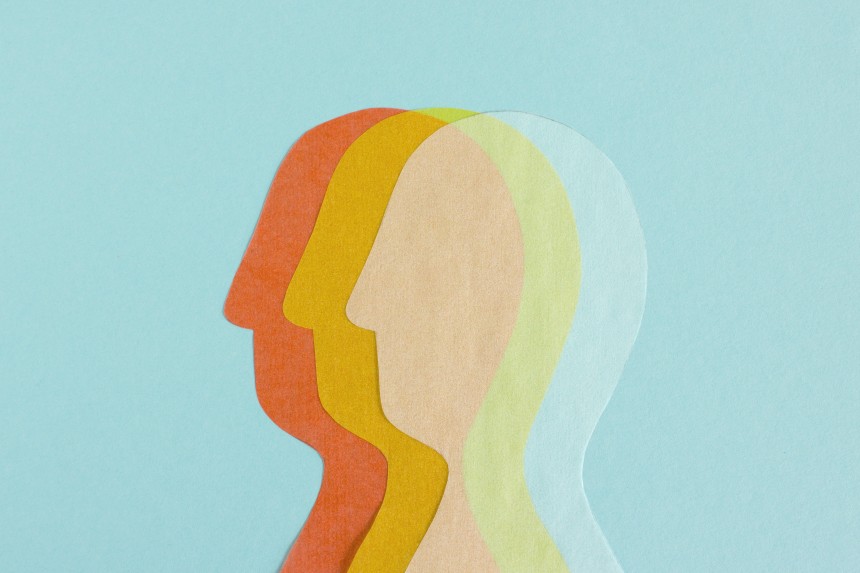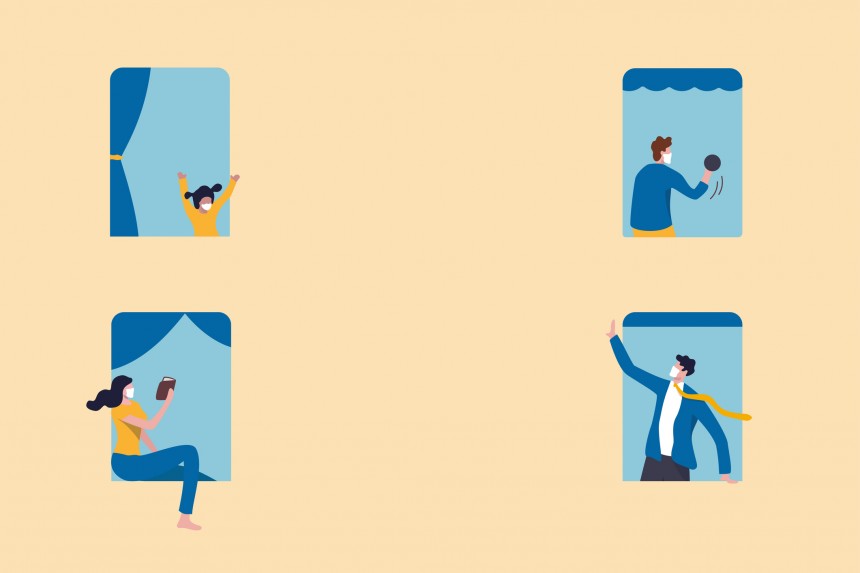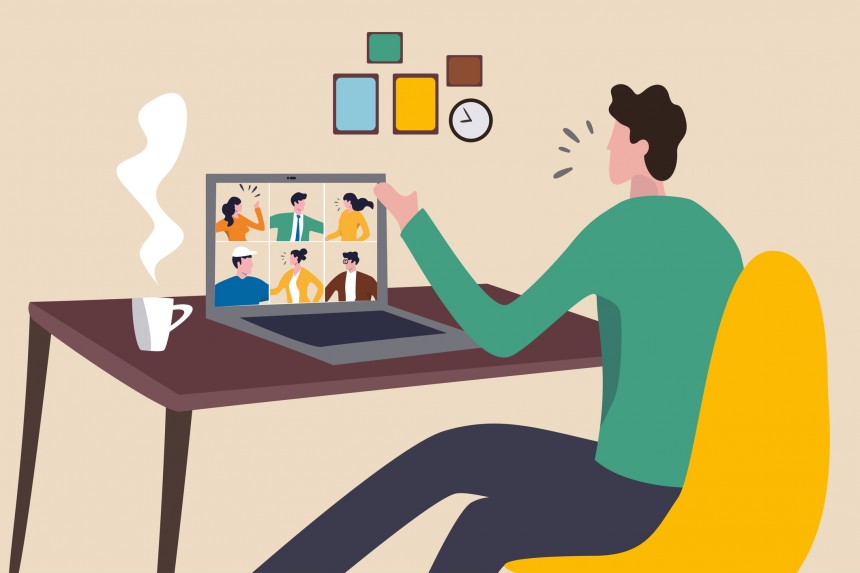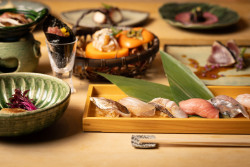
April 10, 2020
Mental Health During the Coronavirus Pandemic
Tips to help you manage your stress and anxiety
Panic buying, remote working, social distancing. These are just some of the changes we’ve had to grapple with as the COVID-19 pandemic continues to affect Japan. Although we can take practical measures to stay safe, it can be more difficult to manage our emotions, stress and anxiety as we adjust to these shifts in our lifestyles. While recognizing the significance of mental health remains a challenge in Japan, it’s important for us to know how mental and emotional wellbeing are affected during a state of emergency, and what we can do about it.
William Cleary, clinical director of the Tokyo-based mental health organization TELL, helps us understand. “The closest thing we can probably connect this to in Japan is likely to be the Tohoku earthquake,” he says. “I was here during that time and these experiences are highly disorientating. We often like to have a set routine and can only handle so much stress before it starts to wear us out. With this pandemic, now everything has changed and we don’t have the same ability to keep our schedules. We [TELL] see that people are really struggling or suffering with that.”
A pandemic is an invisible disaster, yet its effects are just as real. — TELL
Helplessness vs hopelessness
We inevitably feel quite helpless in this situation because much of it is beyond our control. The government’s decisions, the choices of others around us and — especially for international people in Japan — the potential language barriers and distance from family back home can exacerbate this.
“We have to be careful about how much of that we take on as our own responsibility to fix,” Cleary says. “Those things we have to let go and depart from. But that doesn’t mean we’re hopeless.”
“There’s lots of things we can place our hope in, whether that’s religion, connecting with someone you love, or sharing an encouraging word,” he explains. Do what you can within your own means and be mindful about what’s within your own control. Know you’re not hopeless in this situation.

“Physical” not “social” distancing
“We use the term ‘social distancing,’” continues Cleary, “but it should really be physical distancing while staying socially connected.” In-person meet-ups might be off the cards, but staying connected helps us share our worries and remember we’re not alone in this. “When we’re noticed by other people it helps us feel secure and safe,” Cleary adds. Whether it’s a quick chat or baking something for them, stepping back from your own anxieties and looking at what’s within your control to help others around you can benefit both sides.
The stress of a global crisis can be especially taxing for those with pre-existing mental health conditions like depression, who often don’t connect with others because they’re ashamed or think they should “have it together” a bit more. At times like this though, we need to give ourselves permission to reach out.
“That’s why TELL’s lifeline is so helpful,” Cleary explains. “It’s 100 percent free, anonymous and confidential.”
TELL also has a chat service and offers counseling (currently only online teletherapy), with subsidized services available for those who can’t afford the whole cost. Additionally, the team is hosting workshops to help businesses and schools to cope during a pandemic.

Staying mindful
Although staying social is helpful to keep updated and connected, using SNS platforms can trigger anxiety for some. An employee at a Tokyo company shares, “My shifts have been cut as I’m only part time. I’m trying to make the most of staying at home but I worry when I see all the news on Twitter. It reminds me I’m not making any money and I don’t know the future.”
Cleary advises to remain mindful. “Look at the times during the day where you find yourself quite stressed out. See if you can write down three to five things that particular stress is attributed to. Then come up with a plan to work against that.” That could be anything from using social media less, scheduling “worry time” into your day or taking time out to do something you enjoy.
The #coronavirus outbreak is affecting the way many of us live our lives. It’s normal if this is affecting your mental health and you aren’t alone. We’ve gathered some resources that might be helpful ? https://t.co/AtQZkx6Pks
— Samaritans (@samaritans) April 2, 2020
Checking our emotions
“It’s hard seeing my friends and family in my home country suffering during lockdown. I’m not there for them and I feel guilty that I’m living a far more normal life here in Japan, with less danger and restriction,” says one Tokyo resident.
“Here, we need to check that guilt barometer and assess whether it’s necessary to have this kind of survivor’s guilt at that moment,” reminds Cleary. “Guilt can be a good thing because it motivates you to become better. For example, when it helps you stay productive as you work from home. But when that guilt leads into shame, into you thinking ‘I’m a bad person,’ [as a family member, employee or citizen] that’s an unhealthy level.”

Stress on relationships
Many of us are now under a lot of extra stress, working in our small homes without the usual routines, boundaries and space from our partners and family. “In the middle of a pandemic, your stress levels go up and two things happen,” Cleary explains. “Our ability to be there for people relentlessly goes down, and our need for someone to support and be there for us increases.”
“When you put couples under this much stress, you’re bound to have a lot of conflict and a lot of struggles.” The absence of conflict is not the result of a good relationship, what you do with the conflict when it happens is what’s really important. It’s good practice to remain mindful about your expectations of others at this tough time. Try to create boundaries for yourself and also recognize your own limitations.
If you need to talk, we’re here for you. Check here for our hours https://t.co/PoNEg9deXM pic.twitter.com/r4RJmHeGkL
— TELL (@TELLJapan) April 6, 2020

If you’re in Japan, if you need someone to talk to, if you’re struggling to find clear and concise information about what you should be doing right now or what resources are available during the pandemic, the TELL lifeline is there for you. The team will connect you with what you need.
TELL LifeLine 03-5774-0992
TELL Chat
TELL counseling enquiries 03-4550-1146
Other articles you might find useful:
- TELL: Coping in the workplace with COVID-19
- TELL: Coping with a pandemic
- BBC: Coronavirus: How to protect your mental health
- WHO: Mental health and COVID-19
- NHS: 10 Tips to help if you are worried about the coronavirus
In the case of domestic violence, reach out to DV Soudan+ (NPO with hotline available in 10 languages from May 1)







